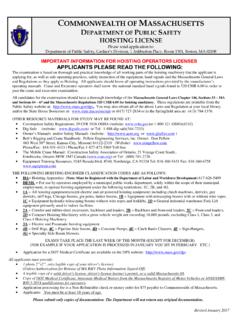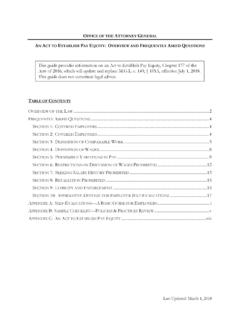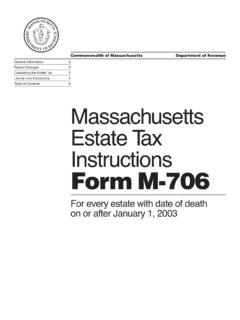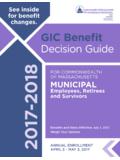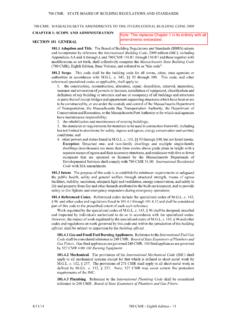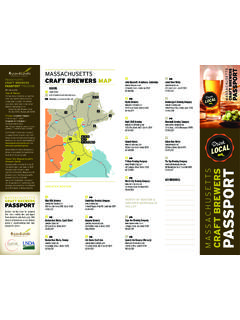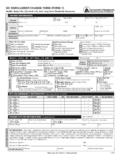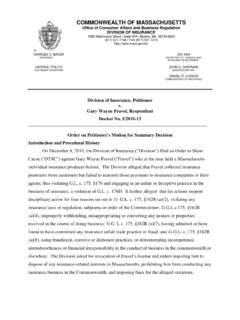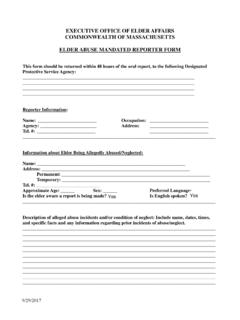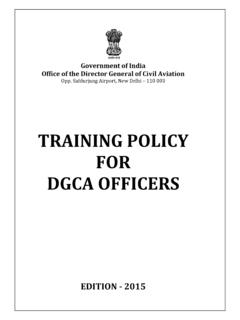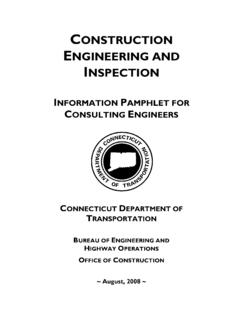Transcription of TOWN OF PHILLIPSTON - mass.gov
1 TOWN OF PHILLIPSTON FINANCIAL MANAGEMENT STRUCTURE | A COMMUNITY COMPACT CABINET INITIATIVE MARCH 2018 PREPARED BY: DLS | Technical Assistance Bureau 100 Cambridge Street, Boston, MA 02114 Christopher C. Harding Commissioner of Revenue Sean R. Cronin Senior Deputy Commissioner Supporting a Commonwealth of Communities | Box 9569 Boston, MA 02114-9569 | (617) 626-2300 March 26, 2018 Board of Selectmen Town Hall 50 The Common PHILLIPSTON , MA 01331 Dear Board Members, I am pleased to present the enclosed financial management structure review for the Town of PHILLIPSTON as part of the Baker-Polito Administration s Community Compact Cabinet initiative.
2 This collaborative program strives to create clear mutual standards, expectations, and accountability for both the state and municipalities. It is my hope that our guidance provides direction and serves as a resource for local officials as we build better government for our citizens. Sincerely, Sean R. Cronin Senior Deputy Commissioner 1 INTRODUCTION Under the Community Compact Cabinet program encouraging best practices in local governance, the Division of Local Services Technical Assistance Bureau (TAB) reviewed the Town of PHILLIPSTON s financial management structure. As a best practice, a community should periodically reassess, and when appropriate, modify its governmental organization to ensure it promotes accountability, enhances service delivery, safeguards assets, and maximizes resources.
3 This project represents the second time TAB has formally assessed operations at the request of PHILLIPSTON s board of selectmen. In 2006, pursuant to a comprehensive financial management review, the bureau presented the town with a broad series of recommendations across a spectrum ranging from organizational concerns to day-to-day procedures and information technology. Among these, we can credit local leaders with accomplishing the following: Converting the treasurer position from elected status to appointed Appointing staff to the assessing department to reduce reliance on private contractors Assigning the town accountant with annual financial reporting duties previously done by a private accounting firm Completing a town-wide update of job descriptions Converting disparate financial databases to a single integrated solution Expanding professional training opportunities Implementing greater use of technology to modernize procedures and communications This constitutes progress, to be sure, though we note that nearly all these actions were taken within the past year.
4 All the same, this small town of 1,746 residents has been experiencing broad disruptions in its governmental operations over the last two years. With one exception, all the personnel responsible for managing financial operations or central administration in PHILLIPSTON are new. It is therefore altogether fitting that local officials seize on this transitional period to take a fresh look at how the town should operate going forward. BACKGROUND As opposed to the wide-scope review TAB conducted in 2006, the narrow focus of this project was to assess the effectiveness and viability of PHILLIPSTON s financial management framework and propose appropriate enhancements.
5 This encompasses the functions of its accounting, treasury, 2 collections, and assessing departments. Given the select board s ultimate responsibility for assuring the town s overall fiscal stability and statutory compliance, our review also examined the role of its day-to-day town hall proxy, the administrative assistant. Any analysis of a town s structure must naturally be done within the constraints of its socioeconomics, and PHILLIPSTON is a modest community by most any measurement. In population terms, it is smaller than 85 percent of Massachusetts municipalities. Similarly, 89 percent of other communities in the state have budgets larger than PHILLIPSTON s, which was $ million in FY2017.
6 As for relative property wealth, its FY2016 per capita equalized valuation (EQV), $111,029, represented about 68 percent of the state s $163,847 average, while its 2014 per capita income of $24,827 amounted to 79 percent of the $31,265 average statewide. Deriving 94 percent of its tax base from residential property, the town s average single-family tax bill last year was $3,336, which is the 10th lowest of Worcester County s 60 communities and roughly 60 percent of the $5,620 average statewide. Within this context, the town relies mostly on part-time staff to provide its services. One exception is the administrative assistant, who works 40 hours per week.
7 The incumbent was hired in August 2017 and has many years of experience in municipal affairs, primarily as a planner. With no administrative assistant mentioned in town bylaws, the position is defined only by a job description, which reads something like an office manager. Beyond the description s text, the board has voted in meetings to delegate additional responsibilities to the position, including acting as records access agent, central procurement officer, and human resources director. Notably, the post lacks any formal supervisory authority and is only marginally involved in developing the annual budget process or coordinating other town activities.
8 In the short time the incumbent has worked in town, however, he has earned respect for his professional skills and established good working relationships with the select board and various town departments. In addition to the administrative assistant, the selectmen appoint the town accountant, treasurer, police chief, fire chief, highway superintendent, and building inspector. In contrast, separately elected individuals or boards head up the tax collector, assessing, town clerk, library, cemetery, planning, and health departments. For most of its history, the assessing department had no appointed town hall employees. Instead, responsibilities were administered by an elected, three-member board of assessors relying heavily on contracted help for much of the day-to-day work.
9 This changed in FY2017, when the board appointed a part-time assessment director and a part-time assistant assessor. Although vendors still fulfill some functions, a substantial range of duties have been effectively moved in-house. 3 Also in FY2017, the select board received resignation notices from PHILLIPSTON s treasurer and town accountant. The new part-time treasurer, whom the board hired in April 2017, has an accounting background but no prior municipal experience and faced a steep learning curve. Fortunately, the new town accountant, appointed in July 2017, has requisite knowledge and a strong skill set to help in this regard. For the last three years, she has served effectively as Templeton s town accountant and continues in that office while she also works each Friday for PHILLIPSTON .
10 In contrast to the town s other finance managers, the collector is an elected, long-serving, and insurance-benefitted official, now completing her 18th continuous year in the office. She intends to run for reelection this May but has given indications of retiring in the near future. In addition to working 20 hours per week as the collector, she also works a few hours weekly as the assistant treasurer and as a clerk for the police and cemetery departments. To assist her in collection duties she has a part-time staff that includes an assistant collector, a clerk, and one or two seniors doing the tax work-off program. Collectively, their work hours add up to roughly two days a week.
